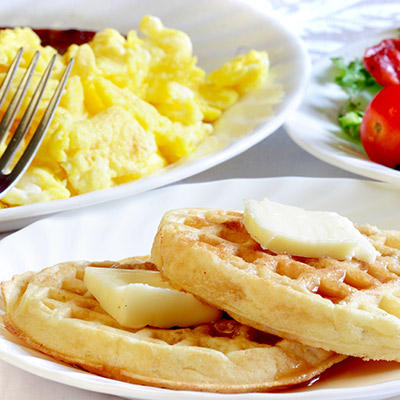All About Eggs

The egg is one of the most nutritious and versatile foods. It’s an essential ingredient in many baked goods and desserts, as well as a popular item for breakfast, lunch and dinner. Whether you’re eating it on its own or using it to make a tasty treat, the egg is truly a wonder food in the kitchen.
Nutritional value
Eggs are naturally nutritious and considered to be a complete protein, because they contain all 9 essential amino acids, building blocks for the body. Getting enough protein in your diet is important because it helps to build and repair body tissue and cells, maintain and build healthy muscles, grow strong hair and nails, as well as fight infections.
Two large eggs contain only 140 calories, 12 grams of protein and an array of vitamins and minerals. These include vitamins A, E, B and B12, as well as iron, folate, zinc, choline and selenium. They are also a source of the antioxidants lutein and zeaxanthin, which are important for maintaining good vision.
Eggs for breakfast, lunch and dinner
Eggs are a versatile food and can be served any time of day. They can be the main component on the plate, or can be used to bind other ingredients together. Here are some ways to use eggs.
Brunch:
Eggs Benedict, frittata, vegetable omelette, scrambled eggs, pancakes, egg sandwich
Snack:
Hard-boiled egg, mini egg muffins, devilled eggs
Lunch:
Nicoise salad, chopped egg sandwich, egg drop soup
Dessert:
Meringue, angel food cake, custard
Dinner:
Egg soufflé, egg and cheese casserole, egg fried rice
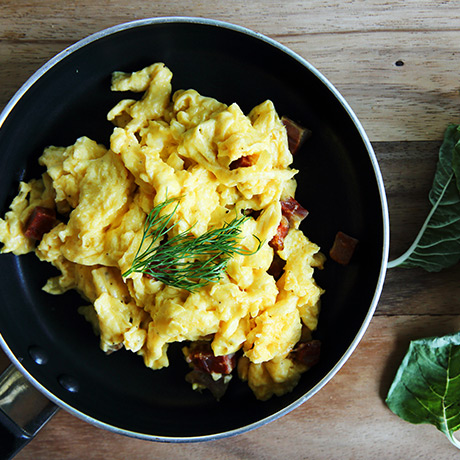
Cooking techniques
Eggs are comprised of mostly water (75%) and protein (13%) and should be cooked quickly over low heat. Cooking them on high heat might make them chewy.
Soft-boiled, medium-boiled or hard-boiled
Start by boiling the eggs in water. The amount of time they spend in boiling water will determine their consistency — about 5 minutes for a runny yolk and up to seven minutes for a hard yolk.

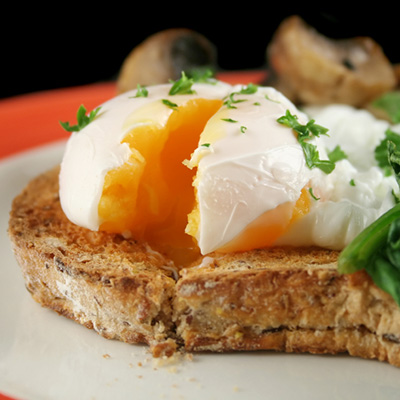
Poached egg
This is an egg that is cracked open and quickly dropped into boiling water with a little vinegar. The egg white will quickly coagulate. To keep it from spreading, do not add salt, which makes the white separate from the yolk.
Poach for 3 to 5 minutes in simmering water; the egg white will be firm and the yolk will be soft. Remove from water with a skimmer, drain, and serve right away.
Scrambled eggs
The eggs are lightly beaten and seasoned to taste. To make your dish even creamier, add a little milk. Cook scrambled eggs in a thick frying pan with a little butter or oil over low heat. Stir gently and constantly with a wooden spoon for 6 to 10 minutes, depending on the amount of eggs in the pan.
As a rule, calculate two eggs per person. When the eggs begin to cook, you can add other ingredients, such as vegetables, mushrooms, cheese, ham, chicken or seafood, to your liking. Salt and pepper are added just before serving.
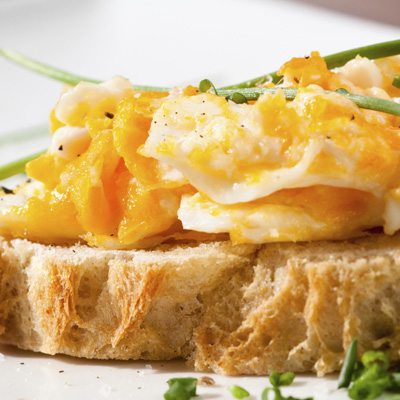
Eggs sunny-side up
Cook the eggs over low heat in a small frying pan on the stovetop or in individual dishes in the oven with a little butter or fat. A small pan or dish keeps the egg white from spreading and thinning out too much.
Break one or two eggs into a small buttered pan or dish. Cook gently. You can cover the pan or dish to make it cook more evenly. The eggs are ready when the egg white is firm and the yolk is liquid and shiny. While cooking, the egg yolk forms a transparent cover that shines, thus the term "sunny-side up."
Fried eggs
Break the eggs into a lightly-oiled (peanut or corn oil) pan and fry for one minute. Fold the egg whites over the yolks to prevent them from overcooking.
The eggs are ready when the egg whites are golden. Drain on a paper towel and serve with toast.
Egg drop
This is a whole egg or egg white that is beaten and dropped into boiling water through a fine sieve. The thin filaments passed through the sieve coagulate immediately on contact with water.
An egg drop is used to garnish soups, particularly in Asian recipes.

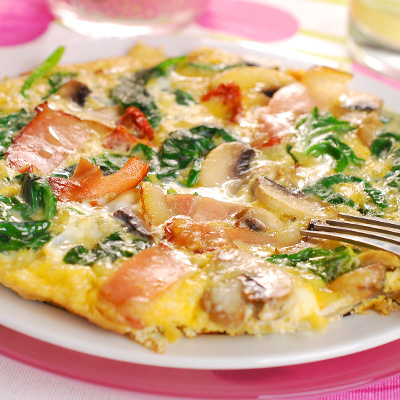
Omelette
An omelette is basically beaten eggs, with salt and pepper, cooked in a frying pan until firm, then folded over. On low heat, the omelette will be cooked all the way through; cooked on high heat, the omelette remains soft inside. Herbs and spices can be added to the egg mixture before cooking. Some vegetables, meat, or cheese can be prepared and cooked, then added to the omelette before it is folded.
Floating island (oeufs à la neige)
This dessert is created using egg whites, beaten at room temperature, until they become thick and frothy.
Ensure your whipping utensils are very clean and avoid using plastic tools, which won’t make the eggs as frothy. Try to use a copper bowl to beat the eggs — the protein in the egg white interacts with the copper and the egg whites can inflate to eight times their original size. Avoid using an aluminium bowl.
Add a pinch of salt or cream of tartar before you start. There should be no egg yolk in the mixture. To prevent any yolk from entering into the mix, separate the eggs individually in a separate bowl and add to the rest only if completely intact. Add sugar only when the egg whites begin to froth.
The mixture is ready when firm enough to form peaks. Avoid over-beating which can destroy elasticity.
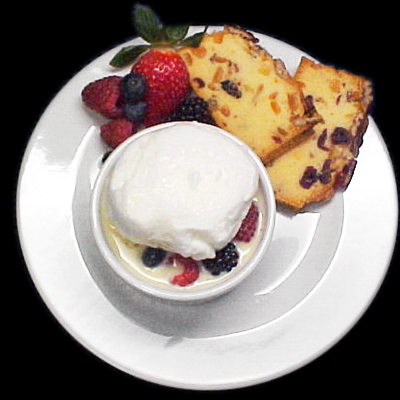
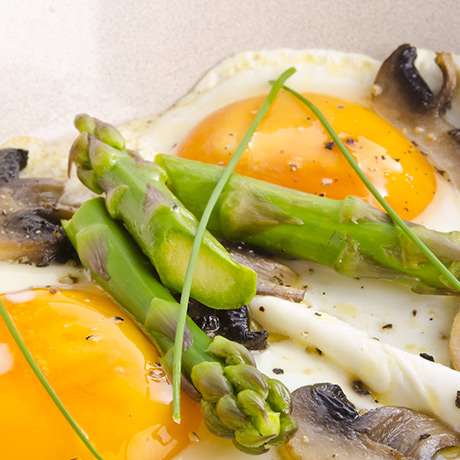
Will eggs raise my cholesterol levels?
There is no need to avoid eggs because of concerns linking them to high cholesterol and heart disease. Healthy adults can enjoy one egg every day (or seven eggs per week) without increasing their risk of heart disease. Research shows that dietary cholesterol, like what’s in eggs, has very little effect on our blood cholesterol levels. It’s more important to maintain a healthy body weight, be physically active, not smoke and choose foods low in saturated and trans fat.
Eat the egg yolk too!
Eggs contain many important nutrients, and most of them, including half the egg’s protein, Vitamin D, and healthy omega-3 fats, are found in the egg yolk. If you don’t eat the yolk, you’ll miss out on many of the egg’s nutritional benefits.
Choose omega-3 enriched eggs
Omega-3 fats are healthy type of polyunsaturated fat that’s important for heart and brain health. Some hens are fed with omega-3 rich feed such as flax, and their resulting eggs are higher in omega-3 fat. Eggs enhanced with omega-3 fats contain up to four times more omega-3 fats than regular eggs. These enriched eggs can help you meet your daily needs for omega-3 fats. Two large omega-3 eggs provide about half of a woman’s daily omega-3 needs and about a third of a man’s daily omega-3 needs.
Which are healthier – brown or white eggs?
There are no nutritional differences between eggs that come in brown or white shells. What is the difference? It lies with the hens who laid the eggs. Quite simply, white-feathered chickens lay white eggs and red-feathered ones lay brown eggs. They are equally healthy and contain the same amount of protein, vitamins and minerals.
In Canada, hens are fed a healthful diet of specially mixed grain and lay eggs in a controlled environment designed for their health.
Egg Recipes









